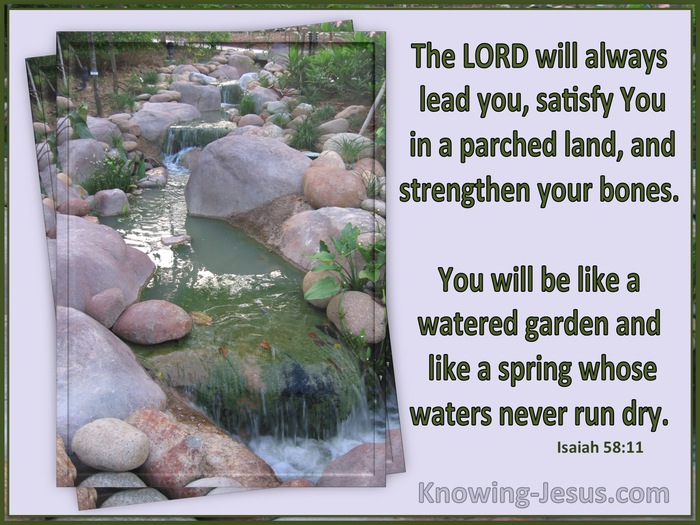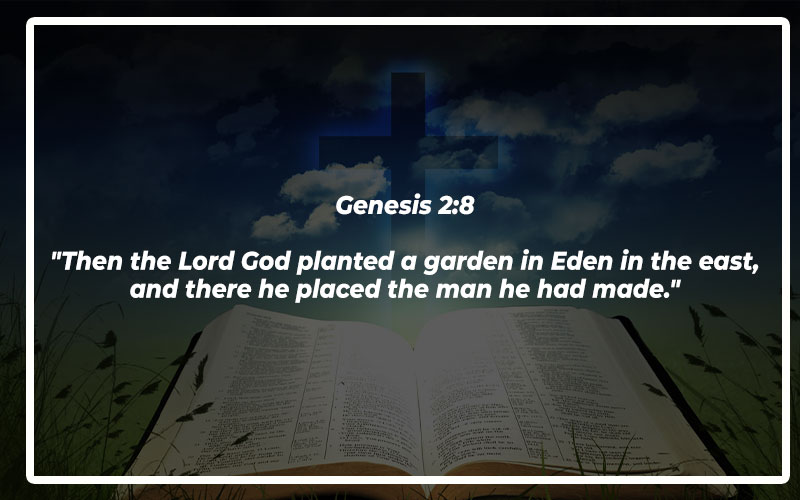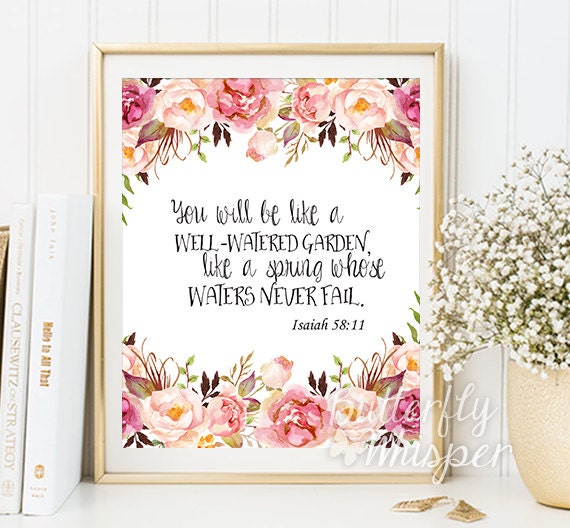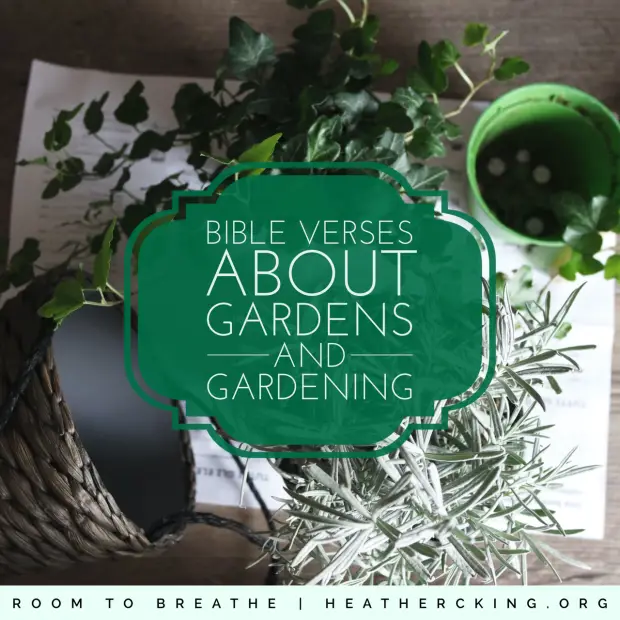Imagine stepping into a garden where every leaf and petal whispers the wisdom of ancient times. Gardens have long been a symbol of peace, beauty, and divine connection.
You might have experienced the serenity of a garden or sought solace amidst its vibrant colors. But have you ever wondered how gardens are woven into the fabric of biblical teachings? Bible verses about gardens hold profound insights that can enrich your life, offering guidance and inspiration.
As you explore these verses, you’ll discover how gardens are more than just spaces of tranquility—they are reflections of growth, faith, and the nurturing of one’s spirit. Ready to uncover the hidden messages and spiritual nourishment these verses offer? Dive in and let the timeless words of the Bible cultivate your soul, like seeds planted in fertile soil.

Credit: bible.knowing-jesus.com
JUMP TO TOPIC
Garden Imagery In The Bible
The Bible is rich with garden imagery. These gardens are more than just lush landscapes. They hold deep spiritual meanings. Gardens in the Bible are settings for important events. They are places of reflection and connection with God. From Eden to Gethsemane, gardens are sacred spaces. They reveal God’s love and creation. Let’s explore the significance and symbolism of gardens in the Bible.
Significance Of Gardens In Scripture
Gardens in the Bible are more than mere settings. They symbolize peace and harmony. The Garden of Eden is the first home of humanity. It represents perfection and divine presence. King Solomon’s garden reflects wisdom and prosperity. These gardens show God’s nurturing nature. They are places where God meets man.
Symbolism Of Growth And Renewal
Gardens in the Bible symbolize growth and renewal. Plants grow from seeds, just like faith. Gardens show the cycle of life and rebirth. They remind believers of God’s promise of renewal. In Isaiah, a well-watered garden symbolizes a soul nourished by God. These symbols inspire hope and spiritual growth.
Lessons From The Garden Of Eden
The Garden of Eden offers timeless lessons for humanity. Its stories teach responsibility and spirituality. By exploring these lessons, we gain insight into our own lives. The narratives encourage reflection on creation and our role within it. They remind us of the spiritual journey we all undertake.
Creation And Human Responsibility
The story of Eden begins with creation. God creates a perfect garden. He places Adam and Eve within it. They are tasked with caring for this paradise. This emphasizes human responsibility towards nature. They tend the garden and keep it flourishing. This teaches us to nurture and protect our environment. It is a duty we all share.
God’s command to Adam and Eve highlights stewardship. They must use resources wisely and care for all creatures. Today, this message remains crucial. We must balance our needs with the planet’s health. Every action impacts the world around us. The Garden of Eden reminds us of our role as caretakers.
Spiritual Lessons From Adam And Eve
Adam and Eve’s story offers deep spiritual lessons. Their experience in Eden is symbolic. It represents the human journey of choice and consequence. God gives them free will. They face temptation and make decisions. Their choices affect their lives and the world.
This narrative encourages self-reflection. It prompts us to think about our own decisions. Are we choosing paths that align with our values? Adam and Eve’s story serves as a reminder. It highlights the importance of making wise choices. Spiritual growth often requires facing challenges and learning from them.
The Garden of Eden is not just a story. It is a guide for living thoughtfully. Its lessons are relevant in our daily lives. They teach responsibility, stewardship, and spiritual awareness. Through these teachings, we find meaning and purpose.
Parables Of Growth In The New Testament
The New Testament is rich with parables about growth and gardens. These stories teach profound lessons through simple imagery. Jesus often used parables to explain spiritual truths. Gardens and seeds were common themes in His teachings. Each parable reveals insights into faith and spiritual development. Let’s explore two key parables that illustrate growth in the New Testament.
The Parable Of The Sower
In the Parable of the Sower, Jesus describes a farmer sowing seeds. These seeds fall on different types of ground. Some land on rocky soil, others among thorns, and some on fertile soil. The seeds represent the word of God. The different soils symbolize the hearts of those who hear the word. Fertile soil yields an abundant harvest. This parable illustrates how the word can grow in receptive hearts. It teaches the importance of nurturing one’s faith. The message encourages believers to cultivate a heart open to God’s teachings.
Lessons From The Mustard Seed
The Mustard Seed parable is about small beginnings leading to great outcomes. Jesus compares the kingdom of heaven to a mustard seed. Though tiny, this seed grows into a large tree. It provides shelter for birds and other creatures. This parable highlights the power of faith. Even small acts of faith can lead to significant spiritual growth. The mustard seed teaches patience and trust in God’s timing. It reminds believers that growth often starts small but can become substantial. The story encourages nurturing faith, no matter how small it may seem.

Credit: biblerepository.com
Gardens As Places Of Reflection
Gardens in the Bible are serene spots for reflection and spiritual growth. Bible verses often mention gardens as places where people connect with God. These peaceful settings inspire meditation and personal reflection, offering solace and tranquility.
Gardens have always been special places for reflection and spiritual connection. Throughout the Bible, gardens are depicted as serene spots where people can retreat from the chaos of life and find peace. These spaces are not just about the beauty of nature but about the quiet moments you can spend in contemplation and prayer. ###Prayer And Meditation In The Garden
Spending time in a garden can be an opportunity to deepen your prayer life. The natural surroundings can help you feel more connected to God. You might find that the gentle rustling of leaves or the vibrant colors of flowers enhances your meditation. Many people, myself included, have found clarity while sitting quietly in a garden. The simplicity of the setting can make it easier to focus on what’s truly important. Have you ever noticed how a simple garden walk can clear your mind and refresh your spirit? ###Jesus In The Garden Of Gethsemane
The Garden of Gethsemane is a powerful biblical example of a place of reflection. Jesus spent time here in deep prayer before his crucifixion. This shows how gardens can serve as a backdrop for significant moments of spiritual decision. In moments of distress, being in a garden can provide solace. Consider how Jesus turned to prayer in the garden when faced with immense pressure. Can you find a similar refuge in your own garden or a quiet natural space? Gardens invite you to pause and reflect. They offer a unique blend of solitude and connection to the divine. As you explore these sacred spaces, how will you use them to enrich your spiritual journey?Cultivating Spiritual Growth
Bible verses about gardens highlight spiritual growth and renewal. Gardens symbolize nurturing faith, connecting believers with divine wisdom. Exploring these verses encourages reflection and deepens one’s spiritual journey.
Cultivating spiritual growth can be compared to tending a garden. Just as a garden flourishes with attention and care, our spiritual lives thrive when nurtured with intention and dedication. Picture your spiritual journey as a garden, where each experience, challenge, and triumph is like a seed that grows into something beautiful. How can you ensure your spiritual garden is lush and vibrant?Nurturing Faith Like A Garden
Consider your faith as a delicate plant needing daily care. Regular prayer acts as water, keeping your spirit nourished. Bible study provides the nutrients, enriching your understanding and deepening your beliefs. Think about your daily routine—are you watering your spiritual garden consistently? Maybe you find solace in quiet moments or feel rejuvenated through community worship. Share your experiences with others; it can help strengthen your roots, ensuring your faith stands firm even in storms.Steps To Spiritual Maturity
Spiritual maturity doesn’t happen overnight. It involves a series of steps, much like tending to a garden requires consistent effort. Start by setting small, achievable goals in your spiritual practice. Reflect on these questions: Are you dedicating time for meditation or reflection daily? Do you seek guidance from scripture regularly? Don’t rush the process. Allow yourself time to grow and evolve. Celebrate small milestones, like understanding a complex Bible verse or overcoming a personal challenge with grace. Encourage yourself to be patient. Just as a gardener doesn’t expect immediate blooms, you should give yourself grace to grow at your own pace. What new practices can you add to nurture your spiritual maturity today?
Credit: www.etsy.com
Biblical Gardens And Modern Life
Biblical gardens inspire modern life through their beauty and wisdom. Bible verses about gardens speak of peace, growth, and renewal. They remind us to find tranquility and balance in our busy lives.
Biblical Gardens and Modern Life Biblical gardens hold a special place in scripture, offering both literal and metaphorical lessons. These verdant spaces are filled with stories of faith, growth, and renewal. But how can the ancient wisdom found in these gardens be applied to our modern lives? ###Applying Garden Imagery Today
Garden imagery from the Bible serves as a timeless metaphor for growth and renewal. Consider the parable of the mustard seed, which highlights how something small can grow into something magnificent. This imagery can inspire you to cultivate patience and nurture personal growth, even when progress seems slow. You might find that maintaining a garden, no matter how small, can reflect this biblical wisdom in your daily life. A simple potted plant on your windowsill serves as a reminder of the potential for growth and the beauty in nurturing something over time. What small seeds of change can you plant today? ###Creating Personal Spaces For Spiritual Reflection
A garden can be a personal sanctuary for spiritual reflection and peace. By creating a quiet space in your home or yard, you provide yourself with a retreat from life’s noise. Imagine a corner with a comfy chair, surrounded by greenery, where you can read, pray, or simply breathe. Think about adding elements that resonate with you spiritually. A stone path reminiscent of biblical times or a small fountain symbolizing living water can enhance your space. How can you design a garden that speaks to your soul and encourages reflection? Creating these personal sanctuaries allows you to step back and appreciate the simple, beautiful aspects of life. It invites you to pause and connect with your spirituality daily. What will your sacred space look like?Frequently Asked Questions
What Is The Biblical Quote About Garden?
Genesis 2:8 describes the Garden of Eden, saying “The Lord God planted a garden in Eden, in the east. ” This biblical quote highlights the creation of a divine garden, emphasizing its significance in the Bible. The Garden of Eden symbolizes paradise and the beginning of human life.
What Do Gardens Symbolize In The Bible?
In the Bible, gardens symbolize peace, abundance, and God’s presence. They represent paradise and spiritual nourishment. Eden, the first garden, signifies divine creation and harmony. Gardens often illustrate growth and renewal, reflecting spiritual journeys and God’s blessings.
What Is The Prayer About Gardens?
A garden prayer is a request for growth, beauty, and protection. People pray for bountiful harvests, vibrant flowers, and natural harmony. It reflects gratitude for nature’s gifts and seeks divine blessing for flourishing gardens.
What Does The Bible Say About A Gardener?
The Bible often mentions gardeners symbolically. God is likened to a gardener in John 15:1, nurturing and pruning believers. Genesis 2:15 highlights Adam’s role to tend the Garden of Eden, emphasizing care and stewardship. Gardening symbolizes spiritual growth, diligence, and the importance of cultivating one’s faith.
Conclusion
Gardens in the Bible symbolize peace and new beginnings. They teach us about God’s creation and care. Reflecting on these verses can inspire love and hope. Gardens remind us of life’s beauty and God’s blessings. They offer a place for reflection and growth.
Each garden story holds a lesson for our lives today. Whether tending a garden or reading about one, we find spiritual lessons. Embrace these teachings and let them guide your journey. Nature and scripture together can nurture our souls and strengthen faith.
Find peace and wisdom in these biblical gardens.

